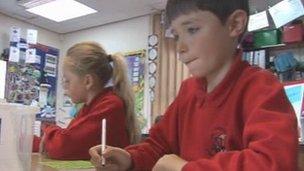Poor literacy standards tackled in schools by Welsh government plan
- Published
A five-year plan aimed at raising poor literacy standards in Welsh schools has been published.
The National Literacy Programme sets out what the Welsh government will do to improve results and change the way literacy is thought about in schools.
The ambition is for Wales to be among the top 20 nations in the Programme for International Student Assessment (Pisa) by 2015.
Wales lags behind England, Scotland and Northern Ireland in Pisa's league.
<link> <caption>The National Literacy Programme</caption> <altText>The National Literacy Programme</altText> <url href="http://wales.gov.uk/topics/educationandskills/schoolshome/curriculuminwales/arevisedcurriculumforwales/literacynumeracyframework/literacyprogramme/?lang=en" platform="highweb"/> </link> (NLP) will set national standards for teachers and pupils to work towards, to ensure a consistent approach to reading and writing across Wales.
The National Reading Tests for five to 14-year-olds, due to be introduced in May 2013, will contribute to that.
The document claims many teachers do not see themselves as teachers of literacy, and as a result, will "need upskilling".
There will be more training available for current and newly qualified staff and best practice will be shared.
The banding system in secondary schools will also identify where extra support is needed and pupils who are falling behind will be offered more targeted help.
Education Minister Leighton Andrews told BBC Wales: "I want to ensure that we get literacy and numeracy right in primary school because if we get it right, then it will have major advantages in teaching in secondary school, not just in the ability to learn, but also it will have an impact on attention, behaviour and attendance."
He said improving levels of literacy and numeracy is a "key commitment" for the government.
"Nothing is more important than ensuring all of our young people have the skills they need to read, write and communicate," he added.
"There are many excellent examples of teaching and learning in literacy across Wales.
"What we must do is ensure that all learners benefit from excellent teaching of literacy and develop the skills that are so vital to their future success.
"The National Literacy Programme will introduce greater consistency and clarity into the way we track pupils' progress while also providing the support, challenge and accountability needed in our schools."
<bold>'Workload concerns'</bold>
The plan comes days after <link> <caption>schools' inspectorate Estyn warned</caption> <altText>Click through to story</altText> <url href="http://www.bbc.co.uk/news/uk-wales-18063788" platform="highweb"/> </link> that many schools in Wales are failing to plan well enough on how to develop basic skills among 11-to-14 year olds
It also said that 40% of pupils cannot read as well as they should as they start secondary school and some never catch up.
Owen Hathway, NUT Cymru policy officer, told BBC Wales the plan was a "positive step forward".
He said that "as noted in the recent Estyn report, past literacy and numeracy guidance has been too broad and ineffective".
"Teachers will welcome the general principle of having a new framework which will hopefully offer clearer and easier guidance," he said.
"As with any new initiatives we will have to monitor its implementation to ensure that it is something worthwhile to the profession.
"There are some concerns around the additional workload teachers will face as a result of the framework, especially in relation to the standard literacy and numeracy testing.
"The last thing we would want to see is another process put in place which restricts teachers from being able to spend quality time teaching students."
Mr Andrews attempted to reassure teachers, adding: "I have signed off on additional support in case there are any issues of workload."
<bold>'Useful tool'</bold>

Improving reading and writing standards is a "key commitment" for the Welsh government
Sherry Saunders, head teacher at Lliswerry Primary School in Newport, said she welcomed the programme.
She said: "The assessment framework that's coming in is very useful but it's a tool that will say this is where our children should be, and like all schools, if you have that, like the national curriculum, then you're all working to the same purpose, so it is vital for that to come in."
Angela Burns AM, shadow minister for education, said the programme would need "robust and thorough monitoring to ensure that young people are not leaving school unable to read and write."
"While we welcome the latest initiative from Welsh Labour ministers to address shortcomings in literacy standards, to succeed, this strategy needs to win the confidence of teachers, parents and school governors," she added.
Plaid Cymru's education spokesperson, Simon Thomas AM, said the new strategy cannot be allowed to fail.
"Our children deserve more than poor test results and failing schools, and I hope that the minister can assure us that this strategy will deliver this," he said.
"Plaid Cymru knows that a focus on developing core skills is vital to a child's education, and we have called for schools to be allowed to develop a better balance between teaching the curriculum and developing skills. I hope this strategy will adopt this approach."
- Published15 May 2012
- Published31 January 2012
- Published8 May 2012